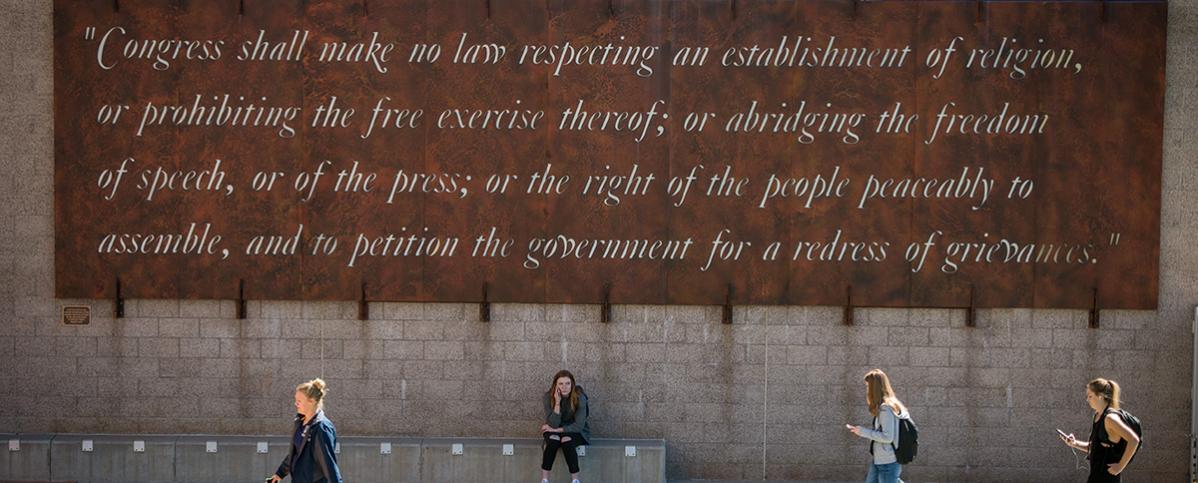
Arizona leads nationally in general education reform with civic knowledge assessment
Board-led general education initiative reinforces commitment to informed citizenship and academic excellence across Arizona’s higher education system.
Under the leadership of the Arizona Board of Regents, the state’s public universities have completed a comprehensive assessment of undergraduate civic knowledge, solidifying Arizona’s role as a national leader in general education reform. This effort stems from the general education policy adopted by the board in June 2019, which requires Arizona’s public universities to evaluate student learning in several areas, including civic knowledge, written communication, quantitative reasoning and critical thinking
The civic knowledge assessment was developed by the Tri-University General Education Assessment group, which includes faculty, staff and university leadership from Arizona State University, Northern Arizona University and the University of Arizona. The group collaborated to create a rubric based on national assessment models, adapting them to meet Arizona’s needs.
Presented during the board’s November meeting, the evaluation results indicate that Arizona is meeting or exceeding civic knowledge standards, underscoring the impact of the state’s comprehensive general education reforms.
“The results of this assessment show that our students are equipped with the civic knowledge necessary to be informed and engaged citizens,” said ABOR Chair Doug Goodyear. “Arizona’s universities are committed to providing civic education that is balanced and constructive. I appreciate how closely the three universities worked together to develop the rubric and assessment tools for this important evaluation.”
The evaluation process sampled assignments from hundreds of students enrolled in courses that fulfill civic knowledge and American institution requirements. The Tri-University group reviewed student work and course content focusing on key areas such as constitutional principles, landmark Supreme Court cases and effective civic participation. Samples were drawn from both in-person and online classes, with each institution using its own approach based on available courses and student work.
Results from each university are not directly comparable, as each institution tailored its rubric and sampling methods to fit its own general education framework. Differences in student populations, course selection and evaluation processes reflect the unique context of each university. The universities will use feedback from this assessment to further improve their curriculum.
At ASU, the assessment focused on humanities and social sciences courses from the General Studies (Gold) program. Results confirm the effectiveness of American Institutions courses in educating students on the principles of U.S. constitutional democracy and civic communication. Faculty feedback from the assessment suggested that some rubric descriptions could be simplified for more consistent application. ASU’s commitment to civic knowledge is further reflected in its School of Civic and Economic Thought and Leadership, which offers courses on political and constitutional history, political philosophies, economic thought, capitalism and free markets.
NAU’s assessment included courses from its legacy Liberal Studies program. Preliminary results indicate that course content and assignments align with the rubric and support student competency in civic knowledge. Results show that most students are meeting or exceeding expectations in all areas of civic knowledge. NAU’s commitment to civic learning is evident in the wide range of academic programs that contribute to civic knowledge component of NAU’s new General Studies Program. Civic education is multi-disciplinary and advanced by faculty across the university.
The U of A assessed general education courses and offerings, including those at the main campus and UAGC. Results show that most students are meeting or exceeding expectations in all areas of civic knowledge. The university’s commitment to civic education and engagement is further demonstrated by the U of A’s Center for the Philosophy of Freedom, which leads interdisciplinary research on free speech, the rule of law, academic freedom, markets and democracy, the gender wage gap and the ethics of just war.
Recent national surveys underscore the importance of this work. According to Pew Research Center, only two in 10 Americans say they trust the government to do what is right. A survey from the Annenberg Public Policy Center showed that less than half of U.S. adults can name all three branches of government. Additionally, fewer than one in four Americans could name freedom of religion as a First Amendment right, down from 56% the prior year. According to a Harvard Business Review study, commissioned by the U.S. Chamber Foundation, the current and future workforce will require employees have knowledge of economic and political processes.
“By driving comprehensive general education reform, the board is taking a forward-thinking approach to ensure that every graduate leaves our universities with the critical skills needed to thrive in a complex world,” said ABOR Executive Director Chad Sampson. “Arizona is setting the pace nationally, and this assessment is a clear example of our university system’s leadership to preparing informed, engaged citizens.”
Arizona’s commitment to fostering civic learning and participation extends beyond the classroom. The board has launched initiatives such as the Regents’ Cup which celebrates free speech and civil discourse through debate and storytelling competitions. The board has also absorbed the National Institute for Civil Discourse, previously housed at the U of A, which exemplifies the mission to promote informed citizenship and the respectful exchange of varied perspectives. Arizona’s universities have embraced NICD’s mission and the traditional role of universities as epicenters for the marketplace of free ideas.
Together, the university centers, education reforms and system wide initiatives highlight the Arizona’s dedication to cultivating informed, engaged citizens and advancing civil discourse and learning throughout the state’s higher education system.
 Back to Listing
Back to Listing